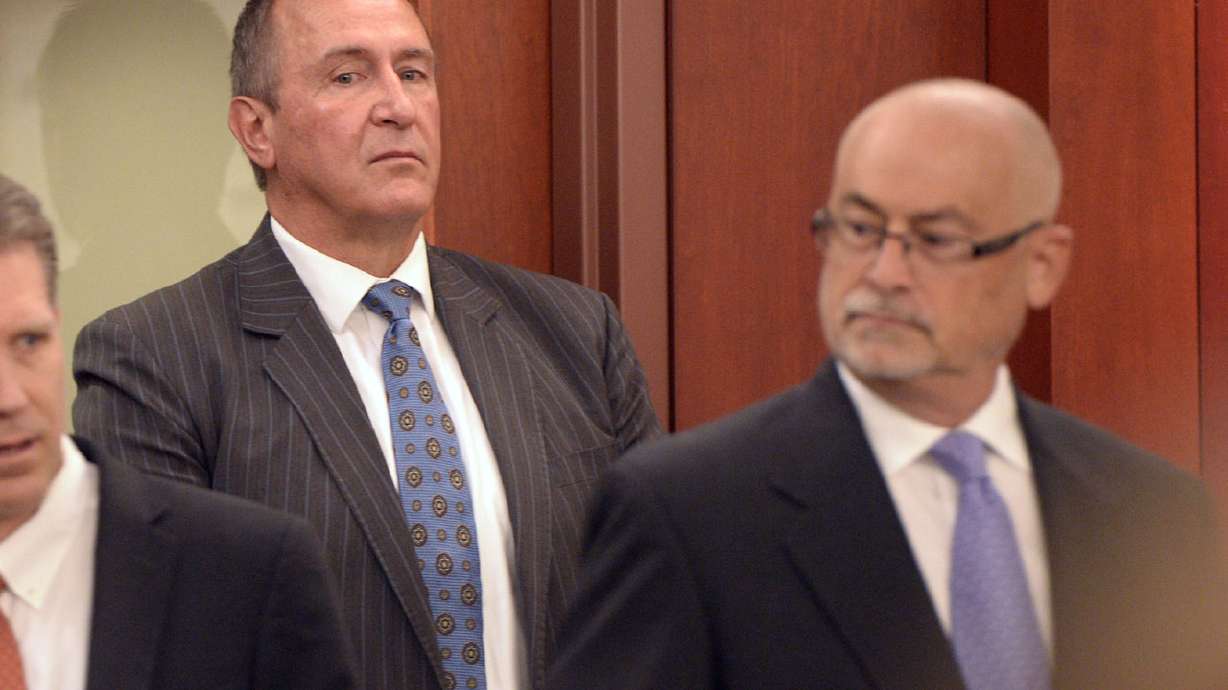Estimated read time: 3-4 minutes
This archived news story is available only for your personal, non-commercial use. Information in the story may be outdated or superseded by additional information. Reading or replaying the story in its archived form does not constitute a republication of the story.
SALT LAKE CITY — State prosecutors in the criminal case against Mark Shurtleff continue to push the U.S. Department of Justice to turn over evidence collected during its investigation of the former Utah attorney general.
Davis County Attorney Troy Rawlings argues in a court filing Monday that the DOJ can't put a limit on the information it provides the state.
The U.S. and Utah constitutions "do not have provisions that indicate once the government hands over 100,000 pages they are good to go and can stop. If there is a 100,001st, it must also be provided," he wrote.
In September, Rawlings asked a 3rd District judge to force the federal government to provide all the evidence it gathered in its abandoned investigation of Shurtleff and his successor, John Swallow. The DOJ responded last month, saying it has given the state hundreds of thousands of documents it believes are relevant to the case.
Police in Utah don't get to decide what evidence is provided to the defense and what is not, Rawlings contends. Shurtleff's attorney, Richard Van Wagoner, joined the state's motion requesting the evidence.
(The constitutions) "do not have provisions that indicate once the government hands over 100,000 pages they are good to go and can stop. If there is a 100,001st, it must also be provided." - Troy Rawlings, Davis County Attorney
"In defending against a motion to dismiss a criminal case, or a bar complaint, can a prosecutor simply say to the judge, or to the Utah State Bar, 'Well, the police decided they did not have to give it to me,'" he wrote.
Rawlings argues that the U.S. Supreme Court determined that state prosecutors can't delegate the responsiblity to assess whether to charge someone with a crime to the police or any other entity.
The DOJ contends it doesn't have to blanketly hand over everything it has collected.
Touhy regulations
"Deciding this case requires the court to decide a single narrow jurisdictional question: does this court have jurisdiction to compel a federal agency to produce documents when the party seeking the documents has not complied with the federal agency's Touhy regulations?" the response states.
Touhy refers to a U.S. Supreme Court decision recognizing that Congress has given administrative agencies the authority to make regulations for the custody, use and preservation of their records.
Rawlings contends the state court has the authority to order the DOJ and FBI to supply all the evidence.
"The DOJ does not get a mulligan because a state prosecutor is interested in the full scope of the case and the defendant in the state case is interested in the same," he wrote. "Particularly when, to their credit, local FBI agents were in tune with the overlap of the full scope of the case, but were not able to sit down and play that grand piano, through no fault of their own."
The DOJ's Public Integrity Section declined to prosecute Shurtleff and Swallow two years ago after conducting its own investigation. Still, several local FBI agents stayed on the case, working with state and county investigators.
- Accepting gifts (3 counts)
- Bribery to dismiss a criminal proceeding
- Obstruction of justice
- Obstructing justice
- Official misconduct
Shurtleff is charged with five felonies — three counts of accepting gifts and one each of bribery to dismiss a criminal proceeding and obstruction of justice — and two misdemeanors of obstructing justice and official misconduct.
Swallow faces a dozen felony charges, including pattern of unlawful activity, accepting gifts, bribery and money laundering, in state court.
- Pattern of unlawful activity
- Accepting gifts
- Bribery
- Money laundering
Both men, who face up to 30 years in prison if convicted, have pleaded not guilty.








